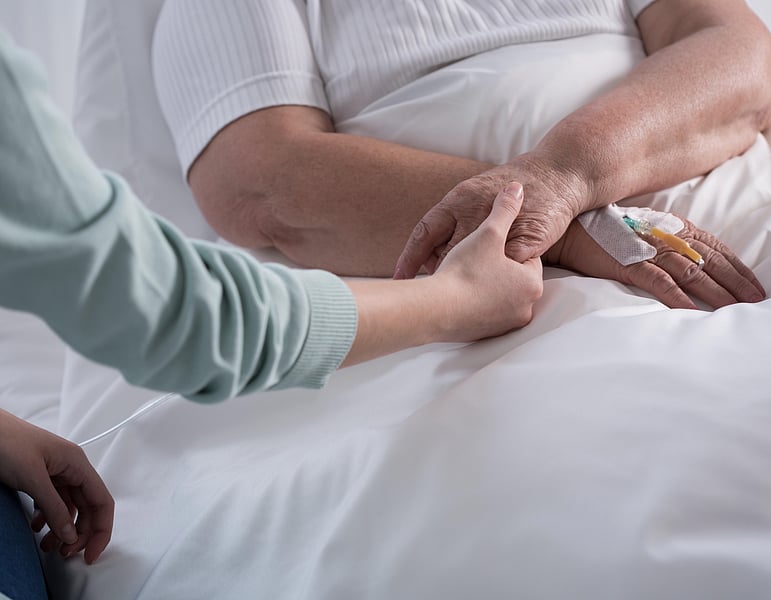Patient Resources
Get Healthy!
Raise Med Dosages in Weeks After Heart Failure Crisis for Better Outcome: Study
- November 10, 2022
- Denise Mann HealthDay Reporter

When people with heart failure wind up in the hospital, it tends to become a slippery slope: They are more likely to be readmitted or die within six months during this vulnerable period.
Now, new research shows that ramping up doses of three heart failure medications within two weeks of hospital discharge along with more frequent follow-up visits cuts the risk of both hospital readmission and death.
About 6.2 million U.S. adults have heart failure, according to the U.S. Centers for Disease Control and Prevention. With heart failure, the heart isn't pumping oxygen-rich blood as well as it should, causing fatigue and shortness of breath.
Current guidelines call for the use of three or four drugs to help reduce the chances that a person returns to the hospital or dies from heart failure, but few doctors follow them. Optimal doses of these medications are given to just 1% of heart failure patients in the United States.
"When patients are hospitalized for heart failure all around the world, they leave the hospital with no special medications, and the problems come back after two to four weeks," said study author Dr. Alexandre Mebazaa. He is a professor of anesthesia and critical care at the University of Paris and head of critical care at Assistance Publique Hôpitaux de Paris, a French public hospital.
"With this protocol, they are receiving full doses of therapy at two weeks and have markedly reduced rates of readmission and death from heart failure," Mebazaa said.
The best part? The three heart failure drugs used in this study -- beta-blockers, aldosterone inhibitors, and renin-angiotensin inhibitors/angiotensin receptor-neprilysin inhibitors -- are inexpensive and available as generics. The three drugs work together to make it easier for the heart to pump blood out to the rest of the body.
"These findings should change practice," Mebazaa said.
For the study, researchers followed more than 1,000 people worldwide with heart failure after they checked out of the hospital between 2018 and 2022. Folks received usual care based on their doctor's preferences or high-intensity care, which called for ramping up doses of the three medications before they left the hospital. They were also seen for follow-up visits more often.
Everyone was evaluated 90 days after their hospital discharge. The ramped-up regimen was so successful at this point that the study was stopped here instead of at the planned 180 days. The study's data and safety monitoring board said it would be unethical to withhold the high-intensity therapy from the usual care group.
Heart failure readmission or all-cause death occurred in 15% of people in the high-intensity care group, compared to 23% of those in the usual care group, which the researchers said was statistically significant. In addition, folks who received the ramped-up regimen said their quality of life improved. There were treatment-related side effects, but the risk of serious adverse events was similar in both groups, the study showed.
The findings were presented Monday at a meeting of the American Heart Association, in Chicago and online. Findings presented at medical meetings should be considered preliminary until published in a peer-reviewed journal.
Outside experts agreed that this high-intensity therapy should be the standard of care for people hospitalized for heart failure.
"We weren't able to find a therapy to use in the acute hospital period to decrease the risk for worse outcomes down the line until now," said Dr. Carine Hamo, a heart failure expert at NYU Langone Health in New York City.
The study was designed before sodium-glucose cotransporter-2 (SGLT-2) inhibitors were approved for treating heart failure, she said.
Now, this protocol typically involves four drugs, Hamo said.
"We know patients feel better, live longer and do better, so why not use this in the vulnerable phase to safely and rapidly [escalate doses] of the medications that we know are beneficial for them?" she said.
Dr. Gregg Fonarow is interim chief of the Division of Cardiology at the University of California, Los Angeles, and director of the Ahmanson-UCLA Cardiomyopathy Center.
He agreed that it's time to start following this treatment regimen.
"Many clinicians have traditionally believed that delaying heart failure therapy, starting doses low and going slow is the way to go," Fonarow said.
"The drugs begin working within days of initiation and each are additive to each other," he said. "Getting them started as soon as possible, getting to optimal dosing, and remaining on these medications can result in the greatest opportunity to overcome heart failure and achieve successful improvement in heart function. To get and keep your heart beating strong, this "¦ strategy can make a large difference."
More information
The American Heart Association offers more on heart failure.
SOURCES: Alexandre Mebazaa, MD, PhD, researcher, professor, anesthesia and critical care, University of Paris, and chairman, Department of Critical Care, Assistance Publique Hôpitaux de Paris, France; Carine Hamo, MD, heart failure specialist, Division of Cardiology, NYU Langone Health, New York City; Gregg Fonarow, MD, interim chief, Division of Cardiology, University of California, Los Angeles, and director, Ahmanson-UCLA Cardiomyopathy Center; presentation, American Heart Association's Scientific Sessions 2022, Chicago and online, Nov. 7, 2022

